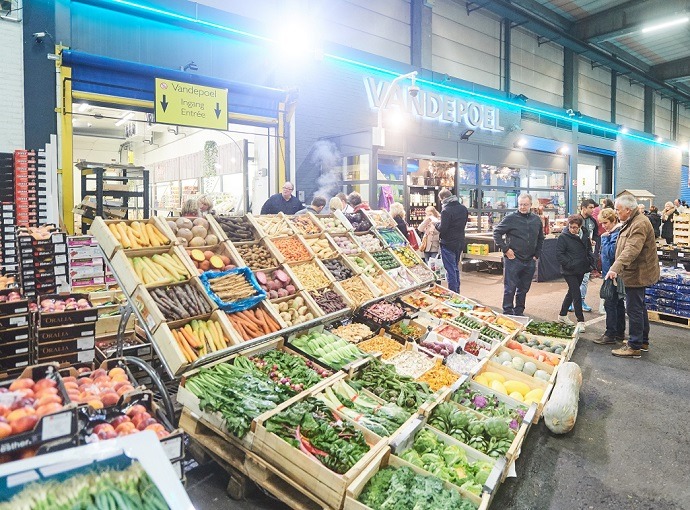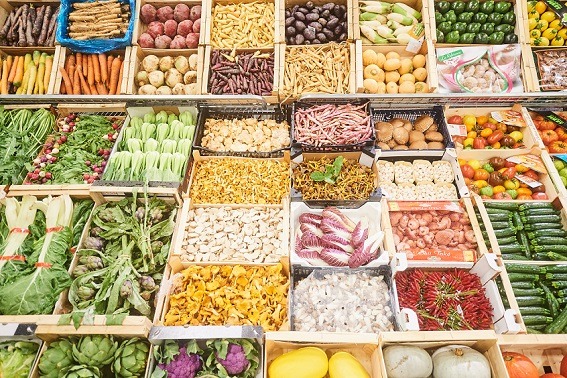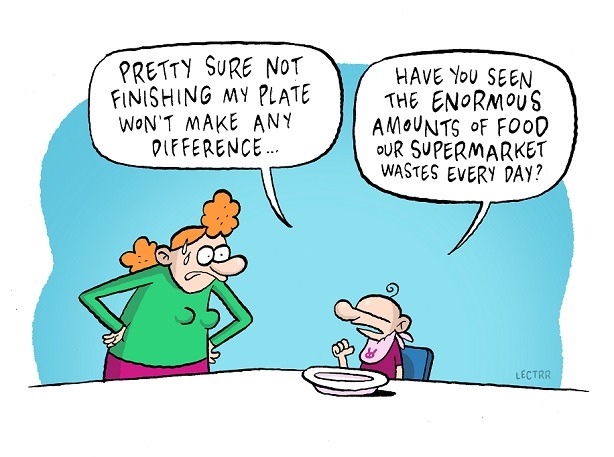It’s 7 p.m. at La Bascule. I park my bike behind a car in front of one of Brussels’ most prestigious bakeries. I introduce myself to one of the volunteers. She’s carrying a pile of boxes full of pastries and a bag of baguettes. When she opens the car, she invites me to taste one. I recognise a few well-known logos of the city’s food outlets. I can’t believe the quantity of pastries and bread crammed into that tiny car. I quickly grab something.
The volunteers have to leave, they are expected elsewhere before heading back to their headquarters, where everything will be frozen, as required by the federal food safety agency (AFSCA). They introduce me to volunteers from another association, who come on cargo bikes. They are perfectly organised: one is actually training another on how to clean out a bakery. The shelves were almost full five minutes ago but are emptying rapidly. Food waste is very impressive when you see it. Everything has to go, to make space for tomorrow’s batch, period.
The thought of the number of bakeries, grocers and food outlets that are left with so many pastries and breads at the end of each day makes me feel ill. And this is just a tiny part of the Brussels food surplus: add the supermarkets and Mabru, the morning market near the Canal, where wholesalers supply all of the city’s food stores with vegetables, meat and fish, and you begin to get an idea of the daily mountain of unsold food in Brussels.
No one has a precise idea of how much food is wasted in the region – some talk about 25,000 tonnes annually. The regional environment ministry, Bruxelles-Environnement, says that it has prioritised (read: allocated financial and human resources) measures to reduce food waste rather than financing a costly analysis of waste along the whole supply chain. It may increase data collection in future by incentivising different sub-sectors to report on the waste they generate. Bruxelles-Environnement is also working with Flanders and Wallonia to set up a common framework for data collection. However, it already admits that “a precise vision of the flows wasted on the region’s territory is unrealistic.”

Mabru market
A few kilometres away from the headquarters of the regional environment ministry at Tour & Taxis, you hear a completely different story. The European Commission is optimistic about collecting data on food waste. On 6 May, it adopted a law laying down a common food waste measurement methodology.
Jyrki Katainen, the Commission Vice President in charge of Health and Food Safety, explained that “in food waste, as in life, what gets measured, gets managed. To be able to implement effective national food waste prevention programmes and promote circularity in the food chain, we need to know where, what, how much and why we are losing food resources.”
EU Member States are expected to put in place a monitoring framework with reporting from 2020 in order to provide the first new data on food waste to the Commission by mid-2022. The EU identified food waste as a ‘key priority’ in its 2015 circular economy strategy and is committed to halve, by 2030, an estimated 88 million tonnes of food waste generated annually in the EU.
Top priority
Fighting food waste is also seen as “a top priority” at Bruxelles-Environnement, “because of its environmental impact”, says Joséphine Henrion, who coordinates the region’s ‘Good Food’ strategy. She recalls Wageningen University's ‘Ladder of Moerman’, which guides public action. It rates the actions on food waste from most to least desirable: preventing waste at source is a must, redirecting it to human consumption (through food aid or transformation) is great, animal consumption is good, turning it into raw materials for industry (blue economy) is okay, while burning it should be the last resort.
According to the regional public waste utility Bruxelles-Propreté, food waste (all of it not necessarily fit for human consumption) represents 40% of the content of our ‘white bags’, which go straight to the incinerator. A 2016 study showed that each resident of Brussels wastes 16kg of proper food per year, which is tantamount to 11.8% of the weight of the white bags. Households are by far the biggest source of food waste, according to Bruxelles-Environnement.
Prevention is therefore its first priority in fighting food waste. For this, the ministry has had to adapt to very diverse groups of people to inform, accompany, train and encourage the prevention of food waste at source. It supports projects such as cooking lessons for schoolchildren and coaching for canteens and hospitals, although “very few projects actually target this particular aim [of preventing food waste].”
One of its flagship measures was to support a network of eight 'Fridge Masters' (‘Maîtres-Frigo’), who act as ambassadors of the fight against food waste and hold local training sessions for households. Forty-four school canteens implemented a monitoring system for food waste to get the ‘Good Food’ label. Bruxelles-Environnement also launched a campaign in 150 restaurants called ‘Rest-o-pack’ to break the cultural taboo of asking for a ‘doggy bag’. Yet most of the food waste actually occurs in the kitchen rather than on the plate. Work is starting with shops and hospitals. The ministry funds two pilot projects started in mid-2018, to analyse how hospitals operate. The aim is ultimately to publish guidelines for hospitals.
Alice Codsi, co-founder of FoodWIN, an association that supports European cities in reducing food waste and creator of the Food Waste Awards, is part of the Good Food Healthcare project. Food waste in hospitals “depends partly from poor communication between the kitchen, nurses and patients. If patients are interrupted when their meal arrives, they won’t eat or finish it. They also need to have the choice between a small and a big plate according to their appetite,” she explains.
FoodWIN gathers all stakeholders together to find solutions ‘in co-creation’: “you have to involve everyone to create winning strategies,” Codsi explains. “It’s the same planning issue in school canteens,” she adds. It looks like micro-management, but fighting food waste starts with successful strategies you can implement universally in collective restauration. These projects go in the right direction, but Bruxelles-Environnement admits that no major regional action on food waste prevention has been undertaken so far for budgetary reasons.
Food aid
So the million-plus Belgian capital has to deal with a huge food surplus. In the best case scenario, it is either redistributed as food aid or transformed to be sold. It can also be dumped into a bin. What decides? Logistics is “the biggest challenge”, says Henrion, speaking for those involved in dealing with the surplus. On the expiration date indicated (for packed food) or when it has to be removed and replaced (for fresh food), you have very little time to grab what’s left before it is dumped.
“Logistics is make or break,” Codsi confirms. Hence, “more and more people involved in the fight against food waste share transport means,” she adds. Packed with volunteers, food banks' only costs are vans and drivers. Some municipal centres for social support (CPAS) have pooled their means to buy a van, which goes to the morning market for surplus food. The DREAM project between the city of Brussels' CPAS and Mabru has redistributed one tonne of food to people in need every day since 2015. The Bourse aux Dons (donations exchange) is a unique platform financed by Flanders and the Federation Wallonie Brussels. It links social services and food markets, plus some supermarket chains like Carrefour and Delhaize.
In addition to these big platforms, Brussels hosts a myriad of small associations staffed by volunteers that redistribute food for free to those in need. Alexandre Vandaele, one of the faces of a Frigo Pour Tous (’Fridge For All’) initiative in Saint Gilles, explains that a lot of associations were created to absorb surplus food from shops after the federal VAT law changed in 2015, exempting them from paying VAT on food surplus given to accredited associations. The 2015 law extended the scope of a 2013 law, making surplus food given to national food banks not subject to VAT. On top of this, in January 2016, Brussels' environment ministry introduced into the environmental authorisation process, a requirement for supermarkets, extending over at least 1,000m², to give away their unsold food.
The freezers and fridges in this garage owned by the Saint Gilles CPAS are crammed with packed food from local supermarkets. “I see people coming regularly. The public is varied: the granny next door, the local worker, the single mother, the refugee with no papers, the disabled or the ecolo who doesn’t want food to go to waste”, he explains. Along with many other local associations like No Javel or Free Go, Share Food, Frigo Pour Tous organises volunteers to collect the surplus food in supermarkets and wholesale markets.
Closing the loop
Some go a step further and sell the food after transformation. I meet Daniele Manno from Medex Museum at the Bread Festival on 4 May on Schuman Roundabout, where he was selling a delicious vegetarian meal cooked from surplus food, served in plates made of bread crusts. Medex organises public meals for free, called ‘Around the world in 183 plates’ (’Le Tour du Monde en 183 Assiettes’). “We have already honoured 27 out of 183 nationalities in Brussels since June 2017 and saved a couple of tons of food from being dumped,” he says.
A couple of days later, at an event in Brussels on waste management in tourism organised by the Association of Cities and Regions for sustainable Resource management ACR+, I meet Aurélie Beya, who catered a delicious lunch cooked partly with fruits, vegetables and bread gathered from surplus food.
Her association, Shake Eat, has partnered with a few organic shops which give her their surplus. “We always find time to drop off part of what we collect to some associations. And when we cook 300 items of finger food, we can make another hundred to give as food aid, since our raw ingredients are free.”
Like the other people I have met, she is shocked by the idea of dumping edible food. She decided to act after having worked, freshly graduated from ICHEC business school, in big companies where the human factor came well after the profit motive. She now works according to her values, recuperating 150 kg or so of food waste weekly.
Fruitopia goes even further in ‘closing the loop’ for surplus food. Simon Ott, its founder, has a mission: he considers it his civic duty to raise public awareness about and reduce food waste. “It’s horrible to dump food,” he says.
After two years of testing, Fruitopia’s small canning factory is poised to open for business with its partner, the chain of local organic shops Färm. Fruitopia will collect Färm’s leftover fruit and transform it into jams and compotes, and sell it back to Färm, who will market them in its outlets. The latter already recycles its unsold vegetables into soups made by Travie, a company that employs disabled workers.
Behind that project, you will find Rob Renaerts, someone who is involved in several flagship food waste projects. His most emblematic venture is Babylone, a beer made from surplus bread in partnership with Delhaize and local brewery the Brussels Beer Project. The initiatives fighting food waste in Brussels are so numerous that they are impossible to list. Some, like the app 'Too Good to Go', use the power of modern technology to match consumers and shops across Belgium – although, paradoxically, the latter have to guarantee some surplus to feed the system.
Other projects such as Sirocco tackle the root of the logistics problem: this initiative dehydrates excess vegetables and fruit from the Cureghem market in Anderlecht or anybody who wants to extend the life of their green surplus. The dehydration facility is located in the Cureghem cellars, next to the Champignon de Bruxelles’s production facility, which is the promoter of the Sirocco project via a joint venture called 'No Waste'.
Concurrent with the evolution of legislation and general awareness of food waste, things are changing in Brussels. The sources of waste are so atomised within the city, that it is impossible, so far, to get a full picture of the leftover food that is perfectly fit for human consumption. It happens at all stages of the value chain, from production and transformation, to distribution and consumption.
Will Brussels reduce its food waste by a third in 2020 as the Good Food strategy calls for? The emerging consensus around the fight against food waste could give political resolve to the next government to work on bold measures with big players, such as wholesalers and retailers. After all, they are the kings of logistics, and this is the weakest link in the fight against food waste in Brussels.
By Hughes Belin


